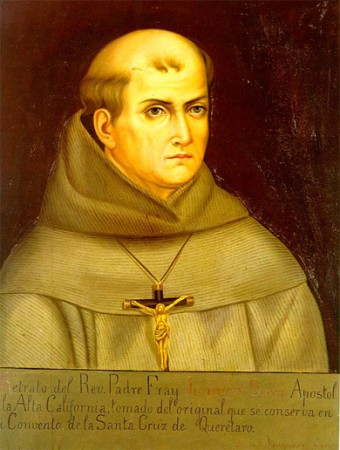From far away out here along the Mission Trail in Santa Clara, California the canonization yesterday (September 23) by Pope Francis of Junipero Serra seems out of place and in the wrong time. And those aren’t casual criticisms. In fact, they cut to the heart of why it is a mistake for the Catholic Church to make a saint of the missions-founding father.
First, there is the problem of place, which can be boiled down to the question: Why did the canonization take place in Washington, DC, and not in California where Serra made his name? Of course, logistics related to Pope Francis’ visit to the East Coast no doubt played a role. And I think, too, that the canonization of a Hispanic saint in the National Basilica in the nation’s capital is meant rightfully to affirm the significant Latino/a presence in the Catholic Church in the United States.

But from here in California, the whole effort looks like an unartful dodge of the well-known controversy surrounding the canonization. Many California Native Americans deeply oppose it, arguing that Serra was cruel and a central cog in the creation of a mission system that played a significant role in the destruction of native peoples and their cultures. And these Native Americans are hardly the only ones who have such reservations about Serra and the missions. The great contemporary historian of California, Kevin Starr, has said: “It is difficult, in short, to see the whole mission system as resulting in anything other than wholesale anthropological devastation, whatever the sincerely felt evangelical intent of the missionaries and the civilizing goals of the Laws of the Indies.”
How much better it would have been for the Catholic Church to have faced this opposition head-on by aiming to have the canonization in California! Of course, there may have been many protests. But the institutional Church should have engaged those protests, not avoided them. And if the institutional Church could not adequately respond to the reasonable objections of the native peoples and many others, then Serra should not have been made a saint. Catholicism is a religion of place, sense, memory: Detaching the canonization from the history of native peoples in California changed its very meaning. Moreover, Catholicism should proceed in its fundamental decisions by a doctrine that Pope Francis has praised: The consensus fidelium or the consensus of the whole people of God, hierarchy and laity together. It is an injustice that this too-long neglected doctrine was not more deliberately considered to take note of the opposition to the canonization by a too-long forgotten segment of the people of God.
But that is the problem of place. What about the problem of time in Serra’s canonization? Perhaps the strongest argument in favor of his canonization has been to say that Serra was a man of his time. Yes, this line of argument goes, he may have used floggings on native peoples but he did so from a motive of love and correction—even if today we find such floggings for any motive to be abhorrent. Moreover, he also exhibited heroic virtues, defending native men and women from the cruelty and rapacity of Spanish soldiers.
The opponents to Serra’s canonization dismiss this argument too quickly. Too often they either do not focus on the man himself (seeing him only as a function of a system) or they do not see him in his own time (transporting today’s standards back to the 18th century). But even so a more fundamental argument can be made against Serra’s canonization: Saints should be individuals who transcend their times. Whatever Serra’s personal virtues may have been, there is no doubt that he never stepped outside the entire mission system and saw into the future. Fundamentally, he never saw that native peoples were not “children” in need of correction but human beings fully equal in dignity to Serra and all of his co-religionists.
By way of contrast, consider the beatification in May this year of Archbishop Oscar Romero of San Salvador. Among other ways of specifying Romero’s holiness, one is to say that he saw into a future in which the structures of Salvadoran society would not oppress the dignity of thousands of poor men and women, but serve it. And this vision was the cause of his martyrdom.
By comparison, Serra had no such expansive vision. We can say he was a man of his times. But we can also say that, in our saints, we want more than that.
David DeCosse is director of campus ethics programs at Santa Clara University.
